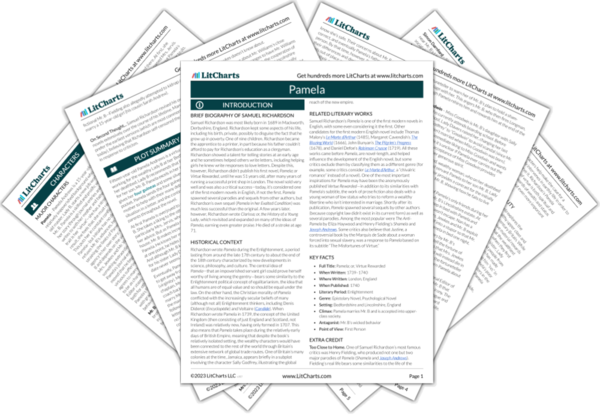As Samuel Richardson’s Pamela demonstrates, life in 18th-century England wasn’t the same for men and women. The novel portrays a patriarchal society where men generally held more power and had more independence than women. Protagonist Pamela’s situation hints at many of the problems that women in that era faced. Pamela notes in her letters and journal that women face a double standard. For instance, she suggests that it’s worse for a woman to lose her virginity than a man. This is why Pamela experiences so much fear and shame around her master, Mr. B, who at times seems like he’s even willing rape Pamela, which would mean the loss of her “virtue.” Pamela’s lower-class status makes her situation particularly bad, but even an upper-class woman like Lady Davers suffers from a double-standard—Mr. B specifically says that while his marriage to Pamela is noble, it would be shameful for Lady Davers to marry one of her stable grooms (because a man becomes the head of the household, and it wouldn’t be appropriate for a high-born woman like her to be ruled by a common man).
But while Richardson often attempts to portray a female perspective sympathetically, his novel undeniably upholds sexist ideas, particularly by modern standards. Pamela endures significant abuse from Mr. B, and even after reforming him, she must follow his rules—all 48 of them—to make him happy, suggesting that he will always be more important than her in the marriage. And while the novel clearly portrays Mr. B’s earlier behavior as wicked, it still reinforces the idea that Pamela should act submissively toward him. Also, while Pamela’s virtue plays an important role in winning admirers, her traditionally feminine beauty seems to be equally important, and the novel portrays women who aren’t traditionally beautiful, like Mrs. Jewkes, in a less positive light. While Richardson’s Pamela examines the difficulties women like Pamela faced in 18th-century England, it undercuts any potentially feminist themes by reinforcing the patriarchal idea that women should put men’s needs above their own.
Sexual Politics ThemeTracker

Sexual Politics Quotes in Pamela
I hope the good ’Squire has no Design: but when he has given you so much Money, and speaks so kindly to you, and praises your coming on; and, Oh, that fatal word! that he would be kind to you, if you would do as you should do, almost kills us with fears.
For I am watch’d, and such-like, very narrowly; and he says to Mrs. Jervis, This girl is always scribbling; I think she may be better employ’d.
I sobb’d and cry’d most sadly. What a foolish Hussy you are! said he: Have I done you any Harm? Yes, Sir, said I, the greatest Harm in the world: You have taught me to forget myself and what belongs to me, and have lessen’d the Distance that Fortune has made between us, by demeaning yourself, to be so free to a poor Servant.
Say no more, Mrs. Jervis; for by G—d I will have her!
Why now, says she, how strangely you talk! Are not the two Sexes made for one another? And is it not natural for a Gentleman to love a pretty Woman? And suppose he can obtain his Desires, is that so bad as cutting her Throat? And then the Wretch fell a laughing, and talk’d most impertinently, and shew’d me, that I had nothing to expect from her Virtue or Conscience
Now I will give you a Picture of this Wretch: She is a broad, squat, pursy, fat thing, quite ugly, if any thing God made can be so called; about forty Years old. She has a huge Hand, and an Arm as thick as my Waist, I believe. […] So that with a Heart more ugly than her Face, she frightens me sadly: and I am undone to be sure, if God does not protect me; for she is very, very wicked—indeed she is.
Fine clothes, sir, become not me; nor have I any ambition to wear them. I have greater pride in my poverty and meanness, than I should have in dress and finery.
Your poor Pamela cannot answer for the Liberties taken with her in her deplorable State of Death.
Now, said he, you are going—I boldly put my hand before his mouth, hardly knowing the liberty I took: Pray, sir, said I, don’t be angry; I have just done.
Since you so much prize your Honour, and your Virtue; since all Attempts against that are so odious to you; and since I have avowedly made several of these Attempts, do you think it is possible for you to love me preferably to any other of my Sex?
This Letter, when I expected some new Plot, has affected me more than any thing of that Sort could have done. For here is plainly his great Value for me confess’d, and his rigorous Behaviour accounted for in such a Manner, as tortures me much.
’Tis even so, my Dear, replied he; and you remember my Sister’s good-natur’d Hint of Miss Sally Godfrey? I do well, sir, answered I. But this is Miss Goodwin. Her Mother chose that name for her, said he, because she should not be called by her own.
Are all so many signal Instances of the Excellency of her mind, which may make her Character worthy of the Imitation of her Sex. And the Editor of these Sheets will have his End, if it inspires a laudable Emulation in the Minds of any worthy persons, who may thereby entitle themselves to the Rewards, the Praises, and the Blessings, by which she was so deservedly distinguished.
















